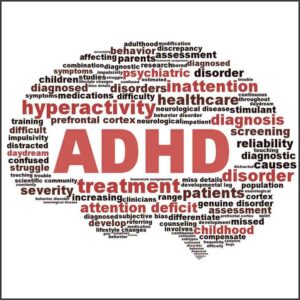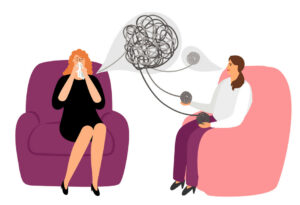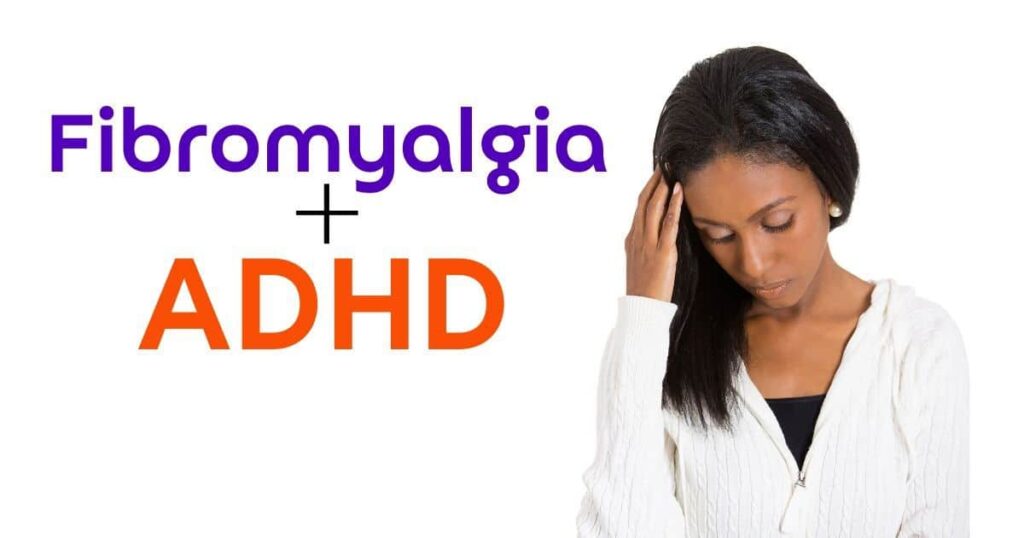Do you know someone who suffers from ADHD and fibromyalgia? If so, you may be wondering if there is a connection between the two conditions. In this blog post, we will discuss some of the research that has been conducted on the topic. We will also talk about how to manage both conditions if you or a loved one are affected by them.
Contents
Defining ADHD
 ADHD is a condition that’s characterized by problems with focus, hyperactivity, and impulsiveness. It’s usually diagnosed in childhood, but it can also affect adults. According to the National Institute of Mental Health, about eight percent of children and two percent of adults have ADHD.
ADHD is a condition that’s characterized by problems with focus, hyperactivity, and impulsiveness. It’s usually diagnosed in childhood, but it can also affect adults. According to the National Institute of Mental Health, about eight percent of children and two percent of adults have ADHD.
In fact, it is believed that there is a strong connection between ADHD and Fibromyalgia. And, ADHD has also been linked to other conditions, such as:
- Anxiety disorders
- Bipolar disorder
- Depression
- Obsessive-compulsive disorder (OCD)
- Substance abuse disorders
This happens because people with ADHD often have difficulty completing tasks, which can lead to problems in other areas of their lives. For example, they may struggle to finish schoolwork or keep a job. This can lead to financial difficulties, relationship problems, and low self-esteem.
It is essential to get a diagnosis and treatment for ADHD, so you can manage the symptoms and live a happy, healthy life.
Defining Fibromyalgia
 Fibromyalgia is a disorder that is characterized by chronic pain and fatigue. The cause of fibromyalgia is unknown, but it is thought to be the result of a combination of genetic and environmental factors.
Fibromyalgia is a disorder that is characterized by chronic pain and fatigue. The cause of fibromyalgia is unknown, but it is thought to be the result of a combination of genetic and environmental factors.
Fibromyalgia occurs more often in women than in men. And most people with the condition are diagnosed between the ages of 30 and 50. However, it can occur in people of all ages, including children and adolescents.
There are a number of symptoms associated with fibromyalgia, but the most common are pain and fatigue. Other symptoms include:
- sleep problems
- cognitive difficulties (known as “fibro fog”)
- headaches
- irritable bowel syndrome
- depression
- anxiety
So, these are some of the key points about fibromyalgia that you need to know. Now, let’s take a look at how ADHD and fibromyalgia may be connected.
The Link Between ADHD And Fibromyalgia
There is currently no known cause for fibromyalgia. However, some research suggests that there may be a link between ADHD and fibromyalgia. There are a few possible explanations for this link.
One theory is that people with ADHD are more likely to experience chronic pain. This may be due to the fact that people with ADHD are more likely to have other conditions that can cause pain, such as migraines or endometriosis. Additionally, people with ADHD may be more sensitive to pain.
Another theory is that people with ADHD may be more likely to develop fibromyalgia because they are more likely to have a history of trauma or stress. This theory is based on the fact that many people with fibromyalgia report having a history of physical or sexual abuse, or other traumatic events.
It is also possible that people with ADHD are more likely to develop fibromyalgia because of genetic factors. Studies have shown that people with ADHD are more likely to have relatives with fibromyalgia, suggesting that there may be a genetic link between the two conditions.
So, the connection between ADHD and fibromyalgia is still not fully understood. However, there are a few possible explanations for the link between the two conditions. If you have ADHD and are experiencing chronic pain, it may be worth talking to your doctor about the possibility of fibromyalgia.
How To Manage ADHD And Fibromyalgia?
 There are a few key things you can do to help manage both ADHD and Fibromyalgia.
There are a few key things you can do to help manage both ADHD and Fibromyalgia.
Stay organized
It is important to stay organized when you have ADHD and Fibromyalgia. This can help you keep track of your symptoms and treatments. Also, it is believed that people with ADHD are more likely to have Fibromyalgia. So, staying organized can help you keep track of both conditions. Moreover, organizations can help reduce stress, which can trigger symptoms of both ADHD and Fibromyalgia.
Keep a journal
A journal can be a helpful tool for managing ADHD and Fibromyalgia. You can use it to track your symptoms, treatments, and progress. It can also help you identify patterns in your symptoms. This can be helpful in finding triggers for your symptoms and determining which treatments are most effective. In fact, journaling can be helpful for managing any chronic condition.
Get plenty of rest
Rest is important for managing any chronic condition. Make sure to get enough sleep every night and take breaks during the day if needed. It is essential to listen to your body and give it the rest it needs. And, enough sleep can help improve symptoms of ADHD and Fibromyalgia.
Exercise
Exercise is a great way to manage ADHD and Fibromyalgia. It can help improve symptoms of both conditions. Exercise releases endorphins, which can help reduce pain and improve mood. It can also help increase energy levels, which can be helpful for people with fatigue.
Eat a healthy diet
A healthy diet is important for everyone, but it is especially important for people with chronic conditions. Eating a healthy diet can help reduce inflammation, which can trigger symptoms of both ADHD and Fibromyalgia. Eating healthy can also help improve energy levels and mood. There are a few things to avoid if you have ADHD and Fibromyalgia, such as caffeine and processed foods.
Talk to your loved ones
 When you are dealing with any chronic condition, it is important to talk to your loved ones about what you are going through. This can help them understand your condition and how it affects you. It can also help them be more supportive and understanding. Talking to your loved ones can also help reduce stress, which can trigger symptoms of both ADHD and Fibromyalgia.
When you are dealing with any chronic condition, it is important to talk to your loved ones about what you are going through. This can help them understand your condition and how it affects you. It can also help them be more supportive and understanding. Talking to your loved ones can also help reduce stress, which can trigger symptoms of both ADHD and Fibromyalgia.
Practice meditation
Meditation is believed to be helpful for managing any chronic condition. It can help reduce stress and improve symptoms of ADHD and Fibromyalgia. Meditation can also help you learn to focus and control your thoughts. And, there are numerous types of meditation that you can choose from.
Stay calm and positive
ADHD and fibromyalgia are a lot to deal with, but it is important to stay calm and positive. This can help reduce stress, which can trigger symptoms of both conditions. It can also help you focus on finding effective treatments and managing your symptoms. Remember, you are not alone in this journey. There are many resources and support groups available to help you manage ADHD and Fibromyalgia.
So, these are some self-help ways to manage ADHD and Fibromyalgia. There are chances that you can get benefit from these tips.
Professional Treatment Options
There are a number of professional treatment options available for those struggling with ADHD and fibromyalgia. These include:
Psychotherapy
 When your condition seems to be related to emotional distress, seeking psychotherapy may be an effective treatment option. Psychotherapy can help you understand and manage your symptoms, as well as develop healthy coping mechanisms. It is also known as talk therapy or counseling. It includes:
When your condition seems to be related to emotional distress, seeking psychotherapy may be an effective treatment option. Psychotherapy can help you understand and manage your symptoms, as well as develop healthy coping mechanisms. It is also known as talk therapy or counseling. It includes:
Cognitive Behavioral Therapy: This type of therapy focuses on helping you identify and change negative thought patterns and behaviors. This can be helpful in managing both the symptoms of ADHD and fibromyalgia.
Behavioral Therapy: This type of therapy helps you learn how to manage your behaviors. It can also help you develop new, healthier coping mechanisms. More often, it is used in conjunction with other treatment options.
Family Therapy: This type of therapy can help families better understand and support each other. It can also help identify any family dynamics that may be contributing to your symptoms.
So, therapies can help you understand and manage your symptoms, as well as develop healthy coping mechanisms. If you think this could be helpful for you, please speak with a mental health professional.
Medication
There are a number of medications that can help treat the symptoms of ADHD and fibromyalgia. These include:
- Stimulants
- Non-stimulants
- Antidepressants
- Anti-anxiety medications
- Pain relievers
Of course, it’s important to speak with a professional before starting any new medication regimen. They can help determine which type and dosage of medication will be best for you. Also, there are certain things that you should discuss with your doctor before taking medication for ADHD or fibromyalgia. These include:
- Your medical history
- Any other medications you’re currently taking
- Possible side effects of the medication
- The potential for drug interactions
- Your goals for treatment
So, it is essential that you have an open and honest conversation with your mental health professional about your symptoms, concerns, and treatment goals. Only then can they help you develop a plan that’s right for you.
Support Groups
 Although support groups are not a cure for either ADHD or fibromyalgia, they can be a very helpful resource for patients and families affected by these conditions. There are many different types of support groups available, and finding one that is a good fit for you can make a world of difference.
Although support groups are not a cure for either ADHD or fibromyalgia, they can be a very helpful resource for patients and families affected by these conditions. There are many different types of support groups available, and finding one that is a good fit for you can make a world of difference.
Moreover, support groups provide a forum for people to share their experiences and coping strategies, which can be invaluable for dealing with these conditions. If you or someone you know is living with ADHD or fibromyalgia, consider joining a support group in your area.
Herbal Remedies
This is a natural way to ease the symptoms of both ADHD and fibromyalgia. There are many different herbs that can be used, but some of the most popular ones include:
- Ginkgo biloba
- St. John’s wort
- Lavender
- Chamomile
- Valerian root
These herbs can be taken in many different forms, such as capsules, teas, or tinctures. Speak with a healthcare professional before taking any herb to make sure it is safe for you. And it will not interact with any other medications you are taking.
Acupuncture
Acupuncture is another alternative treatment that can help with ADHD and fibromyalgia. This ancient Chinese practice involves putting thin needles into the skin at specific points on the body. This is said to improve energy flow and promote healing.
There is some evidence that acupuncture can help with ADHD symptoms, such as impulsiveness and hyperactivity. It may also help relieve pain and fatigue associated with fibromyalgia. If you’re interested in trying acupuncture, be sure to see a licensed practitioner.
Acupuncture is not the only alternative treatment that can help with ADHD and fibromyalgia. Yoga, meditation, and massage therapy are all said to be beneficial for both conditions.
So, these are some professional ways to treat ADHD and fibromyalgia. You can choose these options along with self-help strategies.
Conclusion
To conclude, ADHD and fibromyalgia are two very different conditions. However, there is a clear connection between the two. If you have been diagnosed with ADHD, it is important to be aware of the potential for developing fibromyalgia.
Conversely, if you have been diagnosed with fibromyalgia, it is important to be aware of the potential for developing ADHD. The best way to manage both conditions is to work with a team of healthcare professionals who can help you develop a treatment plan that is right for you.
For more information, please contact MantraCare. ADHD is a neurodevelopmental disorder characterized by difficulty in paying attention, hyperactivity, and impulsivity. If you have any queries regarding Online ADHD Counseling experienced therapists at MantraCare can help: Book a trial ADHD therapy session


